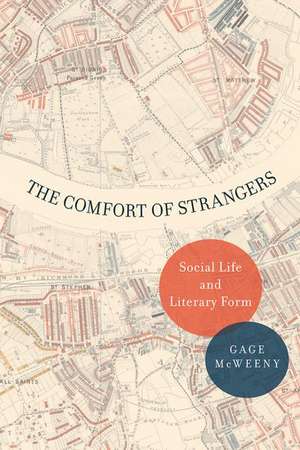The Comfort of Strangers: Social Life and Literary Form
Autor Gage McWeenyen Limba Engleză Paperback – 10 ian 2019
| Toate formatele și edițiile | Preț | Express |
|---|---|---|
| Paperback (1) | 189.12 lei 31-38 zile | |
| Oxford University Press – 10 ian 2019 | 189.12 lei 31-38 zile | |
| Hardback (1) | 492.40 lei 31-38 zile | |
| Oxford University Press – 18 feb 2016 | 492.40 lei 31-38 zile |
Preț: 189.12 lei
Preț vechi: 245.60 lei
-23% Nou
Puncte Express: 284
Preț estimativ în valută:
36.19€ • 38.70$ • 30.17£
36.19€ • 38.70$ • 30.17£
Carte tipărită la comandă
Livrare economică 07-14 aprilie
Preluare comenzi: 021 569.72.76
Specificații
ISBN-13: 9780190887421
ISBN-10: 0190887427
Pagini: 242
Ilustrații: 1 illus.
Dimensiuni: 155 x 231 x 18 mm
Greutate: 0.39 kg
Editura: Oxford University Press
Colecția OUP USA
Locul publicării:New York, United States
ISBN-10: 0190887427
Pagini: 242
Ilustrații: 1 illus.
Dimensiuni: 155 x 231 x 18 mm
Greutate: 0.39 kg
Editura: Oxford University Press
Colecția OUP USA
Locul publicării:New York, United States
Recenzii
...the real thrust of the book is not really historical, but rather theoretical. The core contention is that Arnold, Eliot, Wilde, and James theorize the social in complex and compelling ways, and those ways affect the formal patterns in their art. That claim seems interesting and important regardless of whether it is the product of the rise of a new kind of society in the nineteenth century. And if the current turn toward presentism in Victorian studies ends up changing the field, perhaps at least one of the changes it might induce would be a willingness to take such claims seriously in their own right.
And McWeeny makes a fine case for this distortion in George Eliot's Middlemarch, which seems to be aimed at reducing social complexity to lucid resolutions but which finally fails to do so...Henry James sensed such telling lapses, too, and McWeeny offers superb readings of James's shifty, anxious commentary on Eliot's novels. When James described Middlemarch as "a treasure house of details but an indifferent whole," he was assessing urban social pressure on aesthetic design. The questions James considered about the intersection of social modality and aesthetic expression also pertained to his own practice as a novelist. His later fiction emphasizing equivocal perception, responds to this new pressure of the public sphere by dramatizing a specific kind of social intimacy made possible only by its deflection into writing.
A dazzling achievement. Gage McWeeny captures strangers in all their elusiveness, and, in doing so, renders the most familiar works of the Victorian period newly
Faced with a Victorian literature long seen as devoted to the strong social bonds of marriage, familial relations, and sympathy, Gage McWeeny sets out to study instead the 'weak social ties' and 'stranger relations' that exerted a surprising force on Victorian imaginations. The result is an incisive, suavely-argued, and strikingly original book that promises to refresh debate on nineteenth-century literature's relations with the then-emergent discourses of modern social thought.
This terrific new book shows that, although there wouldn't seem to be much to say about strangers (where's the fun in talking about the people you don't know?), their often unacknowledged presence at the edges of thought in fact exerts immense pressure on the forms of Victorian literature and culture. Revealing the plain fact of other people as a roar on the other side of sociability, The Comfort of Strangers forces us to see the strong force of the weak social ties that linked literary representation to everyday life in nineteenth-century Britain.
In this gracefully written and richly suggestive study of the power of weak social ties, Gage McWeeny shows just how often, and in what a wide range of contexts, Victorian writers put aside questions of personal intimacy or emotional intensity in order to explore the value
...insightful..." Choice
And McWeeny makes a fine case for this distortion in George Eliot's Middlemarch, which seems to be aimed at reducing social complexity to lucid resolutions but which finally fails to do so...Henry James sensed such telling lapses, too, and McWeeny offers superb readings of James's shifty, anxious commentary on Eliot's novels. When James described Middlemarch as "a treasure house of details but an indifferent whole," he was assessing urban social pressure on aesthetic design. The questions James considered about the intersection of social modality and aesthetic expression also pertained to his own practice as a novelist. His later fiction emphasizing equivocal perception, responds to this new pressure of the public sphere by dramatizing a specific kind of social intimacy made possible only by its deflection into writing.
A dazzling achievement. Gage McWeeny captures strangers in all their elusiveness, and, in doing so, renders the most familiar works of the Victorian period newly
Faced with a Victorian literature long seen as devoted to the strong social bonds of marriage, familial relations, and sympathy, Gage McWeeny sets out to study instead the 'weak social ties' and 'stranger relations' that exerted a surprising force on Victorian imaginations. The result is an incisive, suavely-argued, and strikingly original book that promises to refresh debate on nineteenth-century literature's relations with the then-emergent discourses of modern social thought.
This terrific new book shows that, although there wouldn't seem to be much to say about strangers (where's the fun in talking about the people you don't know?), their often unacknowledged presence at the edges of thought in fact exerts immense pressure on the forms of Victorian literature and culture. Revealing the plain fact of other people as a roar on the other side of sociability, The Comfort of Strangers forces us to see the strong force of the weak social ties that linked literary representation to everyday life in nineteenth-century Britain.
In this gracefully written and richly suggestive study of the power of weak social ties, Gage McWeeny shows just how often, and in what a wide range of contexts, Victorian writers put aside questions of personal intimacy or emotional intensity in order to explore the value
...insightful..." Choice
Notă biografică
Gage McWeeny is Professor of English at Williams College.




















